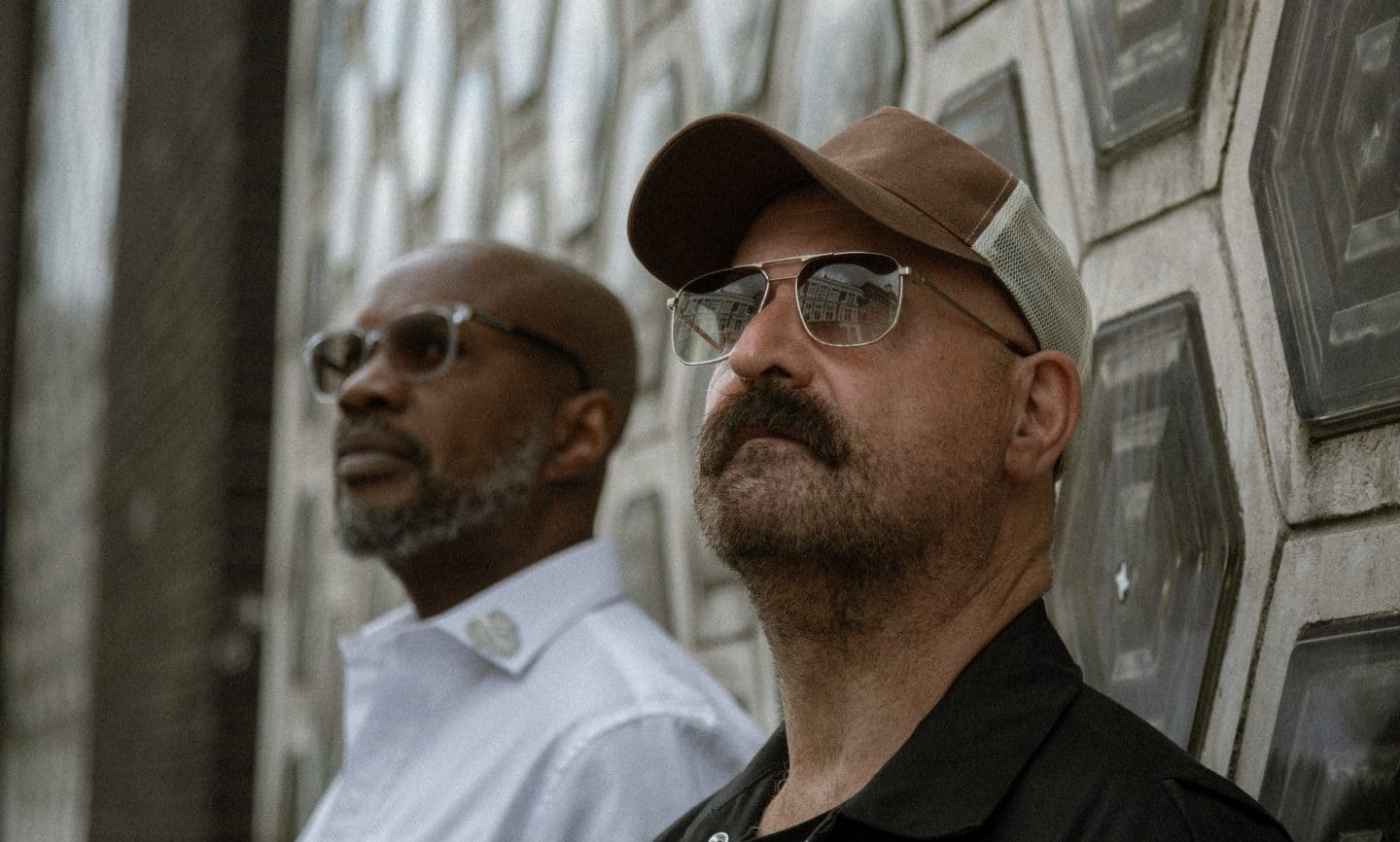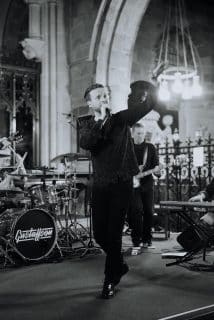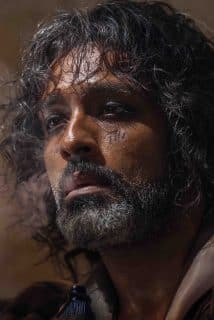Hifi Sean and David McAlmont: “We want this album to be a safe space”
Culture
Hifi Sean and David McAlmont have united for a new album called 'Happy Endings' and it is a brilliant piece of "euphoric melancholia" that will hit home with a lot of people.
After a depressingly boring Brits 2023 in which music played second or even fourth fiddle to various disasters – sartorial and technical – it is left to a pair operating with considered independence from the corporate music industry to restore your faith in pop. Hifi Sean and David McAlmont are a new duo, but seasoned pros at putting great songs together, and their collaboration has resulted in a lovely surprise in the form of an album called ‘Happy Ending’ – a lovely surprise because it is a straight-up pop classic from two cult music figures.
It is not completely out of the blue, since David recorded with a track with Sean for the latter’s collaborations album ‘FT’ from 2016, but the sheer scope of this new album album which the pair recorded on the way out of lockdown, is more fulfilling than anyone could have hoped for. ‘Happy Ending’ is 12 tracks of emotive pop, representing an explosive coming together of two of the most singular talents around. McAlmont is of course the spectacular singer most famous for his albums with Bernard Butler – including the iconic (and not used lightly in this case) single, ‘Yes’ – and Michael Nyman, while Hifi Sean – AKA Sean Dickson – reached pop success with The Soup Dragons in the late 80s baggy era – again, ‘I’m Free’ is right up there as an era-definding single – before becoming a dance and electronica producer and DJ.
Speaking on Zoom, David remembers Sean first asked to be his friend on the oh-so-innocent early Facebook days in the mid-2000’s: “I had no idea who he was, but he requested to be a friend…I noticed these two iterations of him, he was always posting about The Soup Dragons but then there was this new one, this DJ. I knew he was a chameleon, but I didn’t know how much of a chameleon he was.”
The relationship existed largely on apps until Sean approached him to be on ‘FT’, feeling that David fit right into his intentions for the record: “I wanted to make the album with people who are unique to themselves. David fitted into that collection of people who walk their own path very well.”
After recording that track in a studio in Brixton, they began to become proper friends, with Sean attending David’s jazz shows and David coming to Sean’s DJ sets. Crucial to that friendship – and indeed this records – was a mutual love of Prince.
“We had Prince quite heavily in the background of our lives,” says Sean, and he and David began using the Purple One’s approach to the music they wanted to make: “Prince wouldn’t be Prince if he wasn’t a producer. He had it in mind how he wanted it to sound. That’s the pop music that I love, whether its Prince, Bowie or Kate Bush, people who take pop music and turn it on its head and present it in a different way. And they do that through production, basically.”
With that in mind, Sean put down a track, David wrote the lyrics and there was the song ‘Hurricanes’ from the album; a highlight that indeed has echoes of Prince in its strut but with a string-laden wide open feel all of its own.
With that in the bag, Sean called up David to suggest making an entire album…which David didn’t immediately agree to: “After David kept quiet for a night thinking it over, I couldn’t bear it anymore and called him up, talking away – he said, ‘Shut the fuck up, I’d love to make an album.’”
The process then became something of an adventure. Free of any label or management pressure, they could simply do whatever they wanted. “My experience was that Sean was completely unpredictable,” says David, “I didn’t know what he’s going to send me next.”
“We bring the best out of each other,” chimes in Sean, “Usually I’ve been in bands, The Soup Dragons and The High Fidelity. I’ve worked with lots of different people but never one on one – I love it. David brings out a more experimental side of me.”
Warming to his theme, Sean, in his soft Glaswegian accent, goes on, “The word pop has become so downgraded now. It just means poplar music but now it’s become so saturated and light. Where have all the classic pop writers gone? Where have all the genius craftspeople gone? I think we strive for that, we strive to write exciting little odysseys that aren’t too much hard work but are also intriguing.”
Theses odysseys saw the two play with space in the production, allowing what may be minimal instrumentation to expand to epic proportions, a “timeless openness,” as David puts it.
The lead-off track that exemplifies this is ‘All In The World’, a pulsating dance track with surprising depth. “I had the idea of creating a rhythm,” says Sean, “It’s a minimal track, it’s mostly a rhythm, but what David sings on top takes your mind away from it being the same thing. That’s what I love about it, he makes a simple structure sound complicated.”
As for its uniquely atmospheric feel, David says, “We’re both of an age with our highs and lows of being a recording artist and come together at a point where we’re hopeful but recovering from feeling jaded. The songs are bittersweet, there’s angst in there but at the same time its reasonably optimistic.”
“I think our trademark is euphoric melancholia,” says Sean, “We’re very good at that and it’s a hard thing to do. Everything we do has a certain bittersweet melancholy.”
And little wonder it does have that shade to it. For the music they are making isn’t merely an attempt at classic melancholy pop – it naturally springs from the life experiences of these two men, who have been through the mill, both music industry wise and on a personal level, in the course of their lives.
The take a minute to reflect how mental health has played a role in their lives, and David recalls the knock to his confidence as an artist that record companies played:
“What’s enjoyable about working with Sean, is a lot of that industry nonsense is nowhere near us. I can think about how I felt in 2003-4. I just made an album and the guy who signed me to EMI got fired. I thought we’d get dropped. Someone else came in and said to me that he didn’t like my music but let’s see what we can do, “you’ve got a year.” At the end of that year he dropped us anyway. The outcome of that was that every time I sat down and tried to write something, I couldn’t go five minutes without thinking ‘is this a hook? Is this a hook?’ and in the end I gave up on songwriting altogether.
“That question had been drilled into me by people who said you can’t write a hit record you’re no good. You’re useless to us. That really screwed with me.”
He doesn’t know if things are the same in what is supposed to be a more supportive industry now, but he understandably remains sceptical
“We’re talking about 20 years ago. I don’t know if its changed. But they will flirt with you and charm you until you’ve signed on that dotted line, then once you’ve done that it’s the deal with the Devil. They’re not interesting in helping you, they’re interested in exploitation.
I’ve loved working with Sean, with just us two in the studio, but all along the way I’ve thought there’s the tentacles of the music industry awaiting us. So far we’ve managed to avoid that thank god.”

Sean has also had huge highs and lows in the business, including 15 year entirely away from it, and he talks of the value of keeping insular in his endeavours now as well as having down to earth friends who have helped him steer a path through it. He is also very honest and open about his mental health struggles in the past, which were triggered when he came out as gay to his family, and which can’t help but bleed into the music.
“Regarding mental health, to make certain kinds of music you have to taste the lowest points of your life,” he says, “I know the lowest points of my life, which was where I came out. I was married with a child and I came out as gay and it wasn’t a happy coming out, it wasn’t a rainbow flag and unicorn party, it was hell on earth. I nearly killed myself. I made a good attempt to, and ended up in a mental health ward.
“It was at that point I realised, well you can’t go any lower than this so from this point on it can only go upwards. That’s what kept me alive. It was this is pretty damn scary but it can’t go any lower than this, and tomorrow is a better day. I’ve said this before but Tim Parry managed my band at Big Life Records with Jazz Summers, and jazz’s wife was Yazz who sang ‘The Only Way is Up’. I sadly was going through that whole situation being in a room with my belt and shoelaces taken off me, kept in that room as a hazard against myself, I kept singing The Only Way Is Up to myself. Which sounds ludicrous, and it was, but for some reason I found it funny and it suddenly brought something at that moment that made me say to the doctors: “I’m ok”. I was quite lucky, I had a young doctor and I checked that it was a Thursday, he said, yeah, and I asked him if he could let me out to DJ because that’s what I usually did on a Thursday. And he did! I did my usual DJ gig, got in the car at the end of the night dd my usual thing of taking my friend Alan back to his flat, and we were chatting, I asked him what he did that week, and then I told him where I’d been. Over the weeks and weeks he was my shoulder to get me though all that.”
Sean pauses, with the memory of that time still very present for him: “Obviously that does all come out in your music because you tend to gravitate towards things that have a bit more meat on the bone. I can write fluffy pop songs, but I want us to give something back to the music scene which I think is slightly missing.”
David calls the record “psychologically honest”, something which came from an understanding between the pair, first established with a heart to heart on Sean’s balcony: “I remember a long talk on that balcony – which is on the album cover – we had a long talk out there about what we’d been through, and where we’d been. I think Sean was saying I need you to know certain things about where I’ve been. That was an important and special conversation. I think in many respects that’s why the material on the album is the way it is, because I really felt able to express my honesty in that space. If a label had been involved, based on what I know in the past, a lot of what we’ve done would have been challenged. But it being independent means it’s a much more authentically emotional record.”
That honesty gives it an authenticity that you’d be tempted to call old school, and Sean is happy to agree: “It’s like one of those records you always had growing up that were your safe space that you gravitated to, when you wanted someone to give you a hug. I hope that this album somehow connects with people and in that space is there when they need a hug or someone to say and say everything’s going to be ok.”
David: “Yeah, that you’re not the only one.”
Sean: “It has the certain sentiment that the two people who made it know what you’re going through. I tend to love albums that feel like that person’s talking to me or that person’s shared the same experiences I have. It would be lovely to think there’s people out there that this album gives them their safe space, gives them their one hour of escape from whatever they’re going through. That’s what records should do, that’s what music should do.”
And there we have it. Hifi Sean & David McAlmont. Battered, bruised, but still idealists – they believe music can be there for people, they know it can. And this is why there will continue to be music out there that provides solace…because there are people like these two men who still believe in it, and want you to as well. It’s not about the money, not about the fame, it’s all about the feeling. Long may this collaboration continue.
Follow Hifi Sean and David McAlmont on Instagram:

Join The Book of Man
Sign up to our daily newsletters to join the frontline of the revolution in masculinity.



















